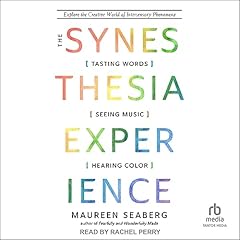
Synesthesia
No se pudo agregar al carrito
Add to Cart failed.
Error al Agregar a Lista de Deseos.
Error al eliminar de la lista de deseos.
Error al añadir a tu biblioteca
Error al seguir el podcast
Error al dejar de seguir el podcast
 Exclusivo para miembros Prime: ¿Nuevo en Audible? Obtén 2 audiolibros gratis con tu prueba.
Exclusivo para miembros Prime: ¿Nuevo en Audible? Obtén 2 audiolibros gratis con tu prueba.Compra ahora por $15.90
-
Narrado por:
-
Keith Sellon-Wright
One in 23 people carry the genes for the synesthesia. Not a disorder but a neurological trait - like perfect pitch - synesthesia creates vividly felt cross-sensory couplings. A synesthete might hear a voice and at the same time see it as a color or shape, taste its distinctive flavor, or feel it as a physical touch.
Cytowic explains that synesthesia's most frequent manifestation is seeing days of the week as colored, followed by sensing letters, numerals, and punctuation marks in different hues even when printed in black. Other manifestations include tasting food in shapes, seeing music in moving colors, and mapping numbers and other sequences spatially. One synesthete declares, "Chocolate smells pink and sparkly"; another invents a dish (chicken, vanilla ice cream, and orange juice concentrate) that tastes intensely blue.
Cytowic, who in the 1980s revived scientific interest in synesthesia, sees it now understood as a spectrum, an umbrella term that covers five clusters of outwardly felt couplings that can occur via several pathways. Yet synesthetic or not, each brain uniquely filters what it perceives. Cytowic reminds us that each individual's perspective on the world is thoroughly subjective.
©2018 Massachusetts Institute of Technology (P)2018 Gildan MediaLos oyentes también disfrutaron:




















Las personas que vieron esto también vieron:


















This is a great starting point to get an overview of synaesthesia, published at just the right time in history when neuroscience can revive a real scientific study of this phenomena and its relevance to so many aspects of perception, learning and the multiverse of neurodiversity.
Interesting read, well written & well narrated.
Se ha producido un error. Vuelve a intentarlo dentro de unos minutos.


